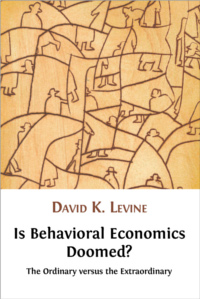"[homo
economicus is] a lightning calculator of pleasures and pains,
who oscillates like a homogenous globule of desire of happiness under
the impulse of stimuli.." Thorstein Veblen 1898

This work is licensed under a Creative Commons
Attribution-ShareAlike 3.0 Unported License.
You are free:
to Share — to copy, distribute and transmit the work
to Remix — to adapt the work
Under the following conditions:
Attribution — You must attribute the work to David K. Levine.
Share Alike — If you alter, transform, or build upon this work, you
may distribute the resulting work only under the same or similar
license to this one.
With the understanding that:
Waiver — Any of the above conditions can be waived if you get
permission from the copyright holder.
Public Domain — Where the work or any of its elements is in the
public domain under applicable law, that status is in no way affected
by the license.
Other Rights — In no way are any of the following rights affected by
the license:
Your fair dealing or fair use rights, or other applicable copyright
exceptions and limitations;
The author's moral rights;
Rights other persons may have either in the work itself or in how the
work is used, such as publicity or privacy rights.
Economic and Game Theory Is Behavioral
Economics Doomed?
|
Is Behavioral Economics Doomed?The Ordinary and the Extraordinary
A book based on my Max
Weber Lecture at the EU Institute on May 20, 2009 |
AcknowledgementsI owe an immeasurable intellectual debt to my coauthors Michele Boldrin, Drew Fudenberg, Tom Palfrey, and Jie Zheng with whom I’ve worked, discussed and debated the issues discussed here for many years. Tim Sullivan encouraged me to write this up in the form of a book, and took the time to read and comment on the draft. Rupert Gatti, economics editor of Open Book Publishers, and his two exceptional referees have enormously improved that original draft.This book originated as a Max Weber lecture presented at the European University Institute. Much of it was written while on sabbatical leave in the Economics Department there. I am grateful to the EUI and the Economics Department there. I also owe a special debt of gratitude to the Max Weber program and to Ramon Marimon, Karin Tilmans and the Weber fellows for the invitation to speak, for a very constructive presentation, and for encouragement and assistance in writing up the lecture. I have presented variations of this lecture in various venues including FUR, the NYU Experimental Workshop, and the Neuroeconomics Meetings. I am grateful to Glenn Harrison, Guillame Frechette, and Colin Camerer for those invitations and to them and the meeting participants for helpful comments and criticism. Like Guillame and Colin, Rosemarie Nagel disagrees with practically everything written here – but her constant provocation has resulted in a much more coherent book. I am also grateful to my daughter Milena Davidson-Levine and to my many students both graduate and undergraduate at Washington University in St. Louis. To the outstanding faculty there and the fine research organization at the Federal Reserve Bank of St. Louis I am also indebted for constant feedback and support. Finally, I would like to thank the National Science Foundation and grants SES-03-14713 and SES-08-51315 for financial support. |
